Wall Street: Money Never Sleeps Blu-ray Movie
HomeWall Street: Money Never Sleeps Blu-ray Movie 
Collector's Edition / Blu-ray + Digital Copy20th Century Fox | 2010 | 133 min | Rated PG-13 | Dec 21, 2010
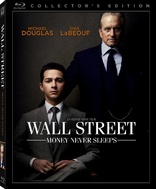
Movie rating
6.1 | / 10 |
Blu-ray rating
| Users | 4.2 | |
| Reviewer | 3.5 | |
| Overall | 3.8 |
Overview
Wall Street: Money Never Sleeps (2010)
Emerging from a lengthy prison stint, Gordon Gekko (Michael Douglas) finds himself on the outside of a world he once dominated. Looking to repair his damaged relationship with his daughter, Gekko forms an alliance with her fiancé Jacob (Shia LaBeouf), and Jacob begins to see him as a father figure. But Jacob learns the hard way that Gekko—still a master manipulator and player—is after something very different from redemption...
Starring: Michael Douglas, Shia LaBeouf, Josh Brolin, Carey Mulligan, Eli WallachDirector: Oliver Stone
| Crime | Uncertain |
| Drama | Uncertain |
Specifications
Video
Video codec: MPEG-4 AVC
Video resolution: 1080p
Aspect ratio: 2.35:1
Original aspect ratio: 2.39:1
Audio
English: DTS-HD Master Audio 5.1
Spanish: Dolby Digital 5.1
French: Dolby Digital 5.1
Portuguese: Dolby Digital 5.1
Subtitles
English SDH, Portuguese, Spanish, Cantonese, Mandarin (Traditional)
Discs
50GB Blu-ray Disc
Single disc (1 BD)
Digital copy (on disc)
DVD copy
BD-Live
Packaging
Slipcover in original pressing
Playback
Region A (locked)
Review
Rating summary
| Movie | 3.0 | |
| Video | 4.5 | |
| Audio | 4.0 | |
| Extras | 3.5 | |
| Overall | 3.5 |
Wall Street: Money Never Sleeps Blu-ray Movie Review
The Gekko’s back to his lizardy ways.
Reviewed by Casey Broadwater December 28, 2010Sub-prime sequel? A decent entertainment return on your investment? A creatively bankrupt film in need of a cinematic bailout? The potential for review-summarizing puns here is nearly endless, but let’s get right down to business. Wall Street: Money Never Sleeps is not the savage satirical indictment of the U.S. financial system that we were all probably expecting from Oliver Stone, who makes no bones about paling around with anti-capitalist chums Fidel Castro and Hugo Chavez. The film, a sequel to 1987’s Wall Street—a time capsule of 1980s excess—is surprisingly laissez-faire in its approach to our recent economic downturn. There are the expected jabs, of course—setting the film around the collapse of an obviously Lehman Brothers-esque company, for instance, or a moment of cynicism about how the government cut interest rates after 9/11 so we could all go shopping—but the director’s tone is much more resigned than it is outraged. The message of Money Never Sleeps—and, for better or worse, this is a “message” movie—is that greed is inevitable, that there’s always going to be another “bubble” on the verge of bursting. As a counterpoint, and potential solution, Stone suggests that we all need to realize that time is more valuable of a currency than money. Specifically, time spent with family.
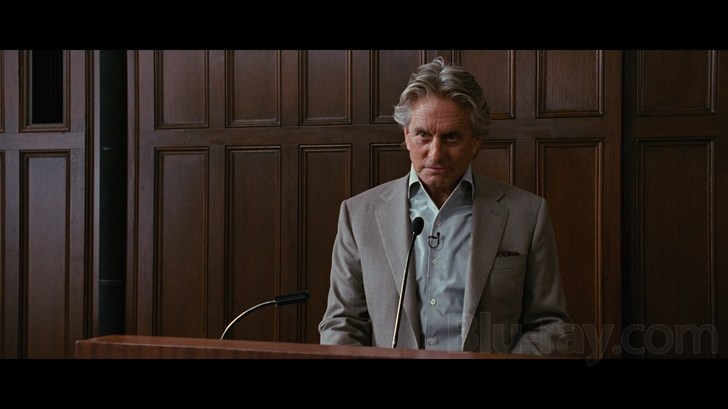
Prepare to be schooled.
Gordon Gekko (Michael Douglas), the reptilian insider-trader of the first film—and one of the most memorable anti-heroes of the 1980s—has little family left. His son is dead of an overdose, his wife has left him, and his daughter, played here by Carrie Mulligan, is willfully estranged. When Gekko is released from prison at the beginning of Money Never Sleeps, in 2001, there’s not a soul to meet him outside the gate. He’s got a little over a thousand bucks to his name and an oversized brick of a mobile phone. That’s it. We fast forward to early 2008, however, and Gekko has posited himself as a financial soothsayer, appearing on cable news shows as “Mr. Insider,” warning of harsh economic times ahead and shilling his new book, “Greed is Good.” Gekko is no dinosaur. He’s a survivor, he’s dodged extinction, and he’s poised for a major comeback. The film’s dangling carrot is the question of whether he’ll remain slimy to the end or attain some measure of redemption.
But, as in the first film, he’s not our main protagonist. That would be hotshot young trader Jake Moore (Shia LeBeouf), who works for the aforementioned Lehman Brothers stand-in, Keller Zabel, an institution on the verge of collapse. Jake is an idealist—he’s trying to scrounge up funding for a seawater-based form of clean power—but he’s also wise to the way the market works and realizes that “green” energy will only catch on when it becomes green itself. That is, profitable. He’s also engaged to Gekko’s daughter, Winnie, a writer for a left-leaning blog called “Frozen Truth” that aims to expose shady political and financial dealings. When the market goes bust and rival firm Churchill Schwartz blocks Keller Zabel from getting a government bailout—leading to the demise of Jake’s boss-cum-mentor-cum-father figure Louis (Frank Langella)—Jake hits up Gekko for advice. The two strike up a loose arrangement based on mutual gain. Gekko will provide dirt on money-hungry Churchill Schwartz CEO Bretton James (Josh Brolin) so that Jake can get revenge, and Jake with attempt to help Gekko reconcile with Winnie. But wait, you may ask, could Gekko’s intentions really be that simple, that pure? You’re wise to wonder.
The film’s greatest pleasure is in revisiting the mammon-obsessed Gekko, a character who—much to Oliver Stone’s bafflement—was actually idolized by some Wall Street up-and-comers when the original film was released. Twenty years after we last saw him, Gekko is still espousing his “greed, for the lack of a better word, is good” mantra, but he wants to qualify that statement and point out that irresponsible greed—the kind of reckless lending that led to the sub-prime mortgage fallout—is just plain stupid. Gekko is hedging his bets more carefully this time around—he tells a group of students that “the mother of all evil is speculation”—and he’s traded his former oversized bravura for sly-as-a-fox, wise-as-an-owl cunning. He darts around the periphery of the story, clearly up to something, his motivations oily and ungraspable. This is a man who was once a major player, and now he just wants to get back into the game. And Michael Douglas slips back into Gekko’s sharkskin suits effortlessly. He acts older, wiser, with a certain sage smugness that hints at his confidence in whatever scheme he’s devising.
Unfortunately, Gekko’s screen time is limited. As in the first film, where he conspired with and was betrayed by Charlie Sheen’s Bud Fox, Gekko is really just a foil for our protagonist, Jake. And while Jake is an inherently more interesting and complex character than Bud ever was—he’s smarter, more ambitious, more conflicted—we never really buy Shia LeBeouf as the intrepid young stock market genius that he’s supposed to be. The surrounding characters are better cast, but the most crucial parts are severely underwritten. Carrie Mulligan, so luminescent in An Education and Never Let Me Go, is hampered by a one-dimensional role that could’ve been much fuller. Likewise, Josh Brolin has a powerful screen presence, but his bullish and revenge-driven James Bretton has little to do. There’s also a subplot with Susan Sarandon as Jake’s house-flipping realtor mom that’s so inconsequential it probably should’ve been cut entirely. The larger issue here is that Money Never Sleeps seems too loose and unfocused, as several storylines overlap but are never woven tightly together. Not that there’s necessarily anything wrong with a little narrative sprawl, but the film loses much of its potential impact in the process.
I wonder, though, what kind of impact Stone intended the film to have. Money Never Sleeps is by no means boring—and in many ways, it’s an enjoyable melodrama—but it does feel passionless and superficial, a charge that could also be laid upon the director’s previous two films, W. and World Trade Center, both of which only surface mined the events by which they were inspired. Here, Stone chronicles the tumult of the 2008 recession from a distinctly Wall Street perspective—there are no blue collar, out-of-work Joe Six-Packs to be found—but the film is less insightful or enraged than it is purely didactic. This is never more apparent than in the scene when Gekko delivers a lecture to a group of college students about the perils of “steroid banking.” It’s us, however, not the students, who are really on the receiving end of Gekko’s lesson, a lesson we’ve all already learned.
Wall Street: Money Never Sleeps Blu-ray Movie, Video Quality 

Like most of 20th Century Fox's recent contemporary releases—say, Knight and Day or The A-Team—Wall Street: Money Never Sleep's 1080p/AVC-encoded transfer is simply gorgeous. To start, there's no signs whatsoever of unnecessary tampering—no halo-inducing edge enhancement, no slathered DNR, no improper boosting, etc. What we have here is an image that looks entirely filmic and natural, with an exceptionally fine grain structure and a sense of clarity that's rarely short of exemplary. There are fleeting moments of softness, but most of the time detail is expressively resolved. Every pore and crow's foot on Michael Douglas' iconic face is visible for our inspection, cloth textures take on a nearly palpable presence, and the interior design of plush New York apartments are rendered with lines as crisp and clean as the furniture. Likewise, color is rich and balanced, bringing life equally to deep mahogany boardrooms, the bright graphics of computer displays, and the vivid hues of a New England forest in autumn. Black levels are consistently deep and contrast has just the right amount of pop. The encode is solid as well. I noticed one or two instances of mild shimmer, but these were on aerial shots that looked to be possibly sourced from stock footage. Otherwise, no compression or technical issues to report. A handsome transfer.
Wall Street: Money Never Sleeps Blu-ray Movie, Audio Quality 
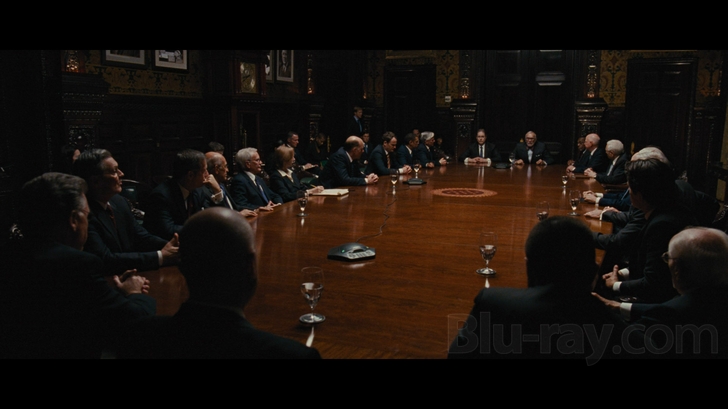
I always expect the sound design of films shot or set in New York City to reflect the metropolis' hectic ambience, and Money Never Sleeps' DTS- HD Master Audio 5.1 surround track certainly does, mostly realistically but occasionally with a more stylized, impressionistic take on big city bustle. For what is essentially a dialogue-driven drama, there's quite a lot of immersive surround speaker usage here. You'll hear the expected New York traffic sounds, the clamor of the selling floor, jarring subway noise, the bass-heavy bump and grind of a nightclub, and the quiet hush of birds and wind in Central Park. There are even some big cross-channel movements, like the roar of Jake's motorcycle and the beating rotors of a helicopter. Plus, the track has no trouble putting the .1 LFE channel to use when necessary. The tone-establishing score by Craig Armstrong—with some help from David Byrne— sounds terrific, and the dialogue is clean, discernable, and acoustically accurate throughout. A great track.
Wall Street: Money Never Sleeps Blu-ray Movie, Special Features and Extras 
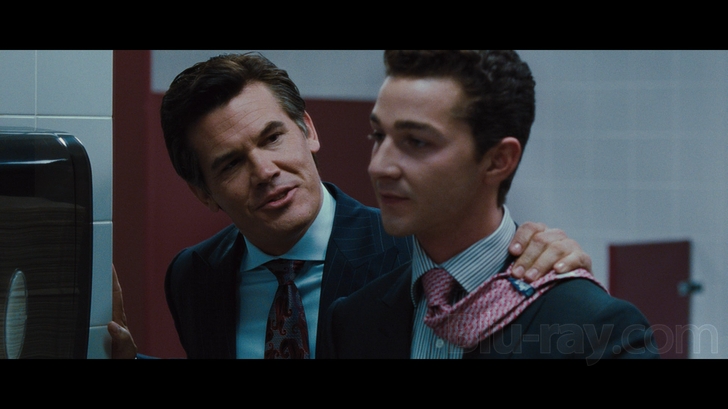
- Commentary by Director Oliver Stone: As expected, an insightful commentary from Stone, who discusses both the practical aspects of filmmaking and Wall Street's timely themes. At one point, he compares Transformers 2 to a "to big to fail bank."
- A Conversation with Oliver Stone and the Cast of Wall Street: Money Never Sleeps (1080p, 15:49): Oliver Stone, Michael Douglas, Shia LaBeouf, Carey Mulligan, and Josh Brolin sit down to talk about the film and the current economic situation.
- Money, Money, Money: The Rise and Fall of Wall Street (1080p, 50:29): A series of excellent featurettes, featuring retrospectives of the original Wall Street, an examination of 1980s excess, a guided tour of Wall Street, and a beginner's guide to the way the economic systems works, both today and in the 1980s. Includes Unfinished Business: Oliver Stone & The Cast on Revisiting Wall Street, Gordon Gekko is Back, Lifestyles of Excess, A Tour of the "Street", and Trends Schemes and Economic Collapse: A Guide to Understanding Wall Street.
- Deleted and Extended Scenes (1080p, 29:31): Includes fifteen excised or trimmed scenes, including a Donald Trump cameo!
- Fox Movie Channel Presents In Character with... (SD): Brief character centric promos for the film. Includes sections for Michael Douglas (5:35), Shia LeBeouf (4:21), Carey Mulligan (5:04), Josh Brolin (5:52), and Frank Langella (5:20).
- Theatrical Trailers (1080p, 3:58): Includes a teaser and the full theatrical trailer.
- Sneek Peek (1080p): Trailers for A-Team (2:25), Cyrus (2:20), Never Let Me Go (2:26), and What's Hot on TV on DVD (1:27).
Wall Street: Money Never Sleeps Blu-ray Movie, Overall Score and Recommendation 
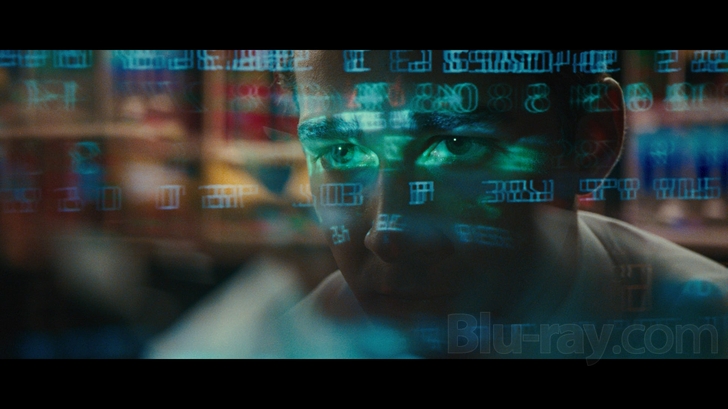
Money Never Sleeps is not the satire of 21st century American finance that I was expecting, and it certainly will never be held in the same regard as Wall Street—which really did define an era—but it's worth watching at least once, if only to catch up with Gordon Gekko. Oliver Stone/Michael Douglas fans will probably be swayed to a purchase by the terrific Blu-ray disc that Fox has put together, featuring a near-faultless video transfer, immersive audio, and a great selection of supplements.
Other editions
Wall Street: Money Never Sleeps: Other Editions
Similar titles
Similar titles you might also like

Wall Street
1987

Gran Torino
2008

Capone
2020

Carlito's Way 4K
1993

Mr. Nice
2010

Lawless
2012

Revenge of the Green Dragons
2014

The Wolf of Wall Street 4K
2013

GoodFellas
1990

American History X
1998

Rounders
1998

Drive
2011

Bad Lieutenant: Port of Call New Orleans
2009

Menace II Society
Director's Cut
1993

Live by Night
2016

Sleepers
1996

White Boy Rick
2018

Donnie Brasco
Theatrical Edition
1997

Scarface 4K
Gold Edition
1983

King of New York
1990

